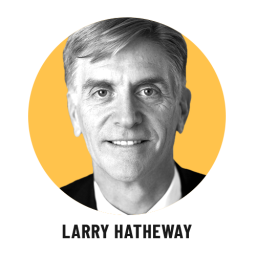Editor’s Note: Larry Hatheway is chief economist at GAM Investments. The opinions expressed in this commentary are his own.

Twelve months ago, investors were giddy.
Markets were buoyant, supported by synchronous global growth and market-friendly US policies, including freshly minted corporate tax cuts and deregulation.
What a difference a year makes. As 2018 draws to a close, investors are unsettled, volatility is spiking and most portfolios are in the red. Large setbacks in global equity and emerging markets, coupled with lackluster performance from bonds, credit and most hedge funds, have left investors unhappy this holiday season.
In 2019, the market environment is likely to remain challenging as growth slows and returns on capital struggle to meet still-lofty expectations.
Households, on the other hand, may fare somewhat better, as their share of the pie grows, courtesy of moderate wage increases. But even so, those gains are likely to be incremental and gradual. Global economic fundamentals explain why.
At first glance, the world economy looks to be in pretty good shape. Not since the 1980s have as many advanced and emerging economies enjoyed a simultaneous expansion like the one now underway. Today, those countries in recession or worse are few in number and small as a percentage of world output (e.g., Venezuela or Argentina).

It has also been nearly four decades since as many advanced economies were at or near full employment. Involuntary joblessness in North America, Europe and Japan is at generation lows. In addition, spending in advanced economies is mostly driven by rising income, a healthy departure from previous debt-fuelled expansions. Household purchasing power has been underpinned by job formation and, more recently, wage gains. Corporate spending, at least in the US and Japan, has been buttressed by profit levels (as a share of GDP) never before seen in the post-war era.
That’s a wonderful, even Goldilocks-like, backdrop. So why are markets not celebrating?
For one thing, the celebrations already took place. Stock markets, especially the US market, enjoyed robust gains from 2009 until mid-2018. Expectations and valuations reached lofty levels.
Meanwhile, US growth peaked in the middle of this year, with a slowdown becoming more discernible by year end. US profit growth had accelerated to over 20% a year by the middle of 2018, a rate not even the most bullish investors believe can be sustained, particularly as profit margins come under pressure from rising wages, debt-financing and tariff-related costs. No other part of the world, with the possible exception of Japan, has the capacity to replace the lost dynamism of US profits growth.
Policy in Washington, D.C. has turned from market friendly to worrisome. Excitement around tax cuts and deregulation has been replaced by the prospect of trade conflict and a government shutdown. Matters aren’t much better elsewhere. Political uncertainty around Brexit, Italy with its populist coalition government and clashes with the EU over immigration and fiscal policy, and Germany, with Angela Merkel’s weakened positioned, has clearly unsettled investors.
More from Perspectives
We dub this period ‘post peak.’ The best of US and global economic growth has passed. The best of US and global earnings growth has passed. In a ‘post-peak’ world, things that investors previously ignored — such as trade disputes, hard Brexit scenarios, or signs of China slowing — suddenly matter. The cushion of accelerating growth has been replaced by the reality of weaker growth and flagging corporate earnings. The margin for error is smaller, precisely as the odds of geopolitical tensions appear to be rising. Unsurprisingly, investors are re-pricing stocks and other assets for ‘post-peak.’
So will 2019 be a replay of 2018, or the start of new recession?
Despite the post-peak warning signs, economic fundamentals suggest there is still a lot to like. Global growth, rising wages and economic resiliency are cheerful outcomes. Rapid innovation and the diffusion of new technologies are the stuff of opportunities to grow and create wealth. Yet the rise of national self-interest and populism has introduced risk and uncertainty. The coming year has the potential to deliver rising prosperity and higher returns for investors, but more so than ever, the outcome depends on whether reason and sound policy will again prevail in the world’s capitals.
